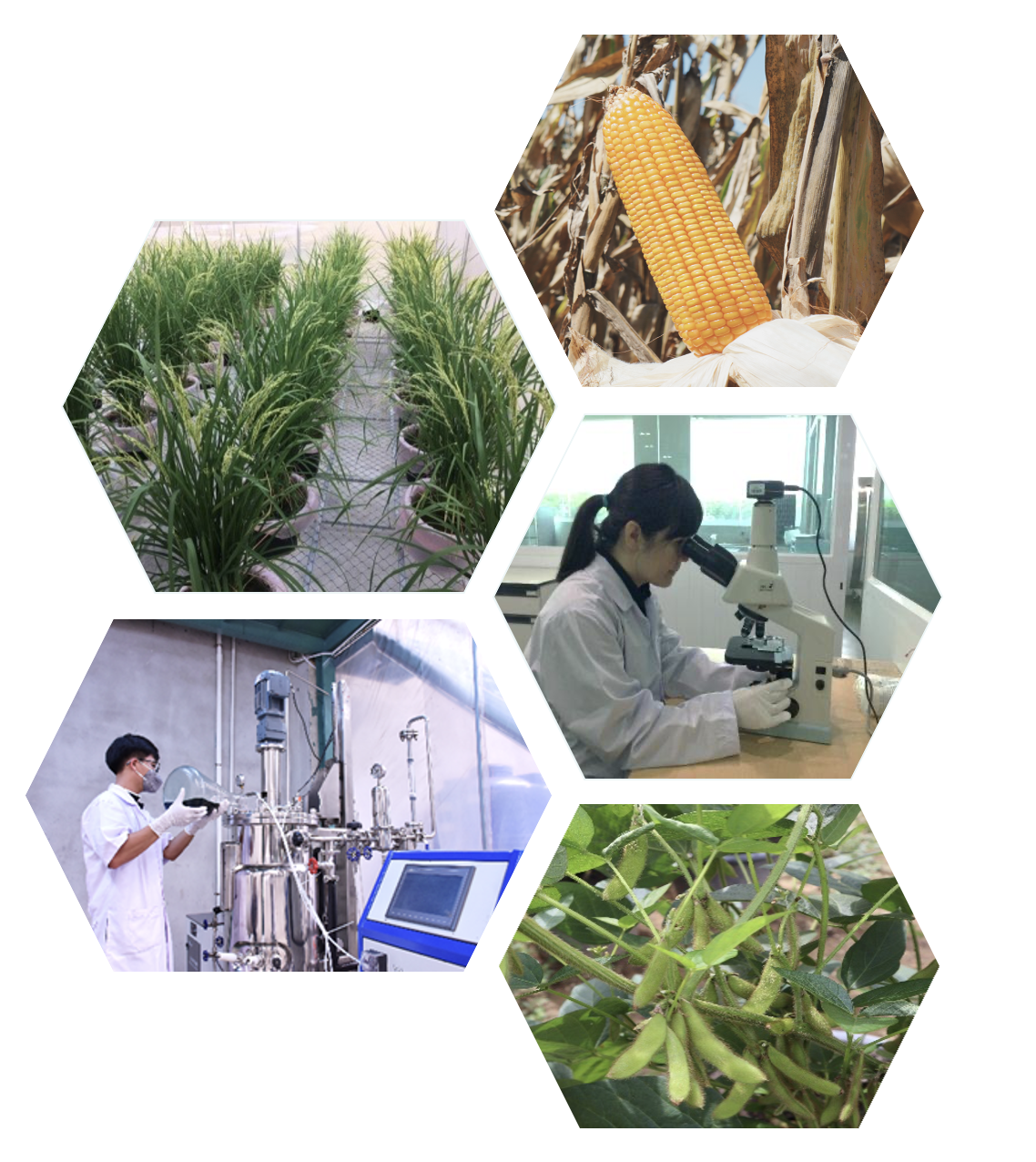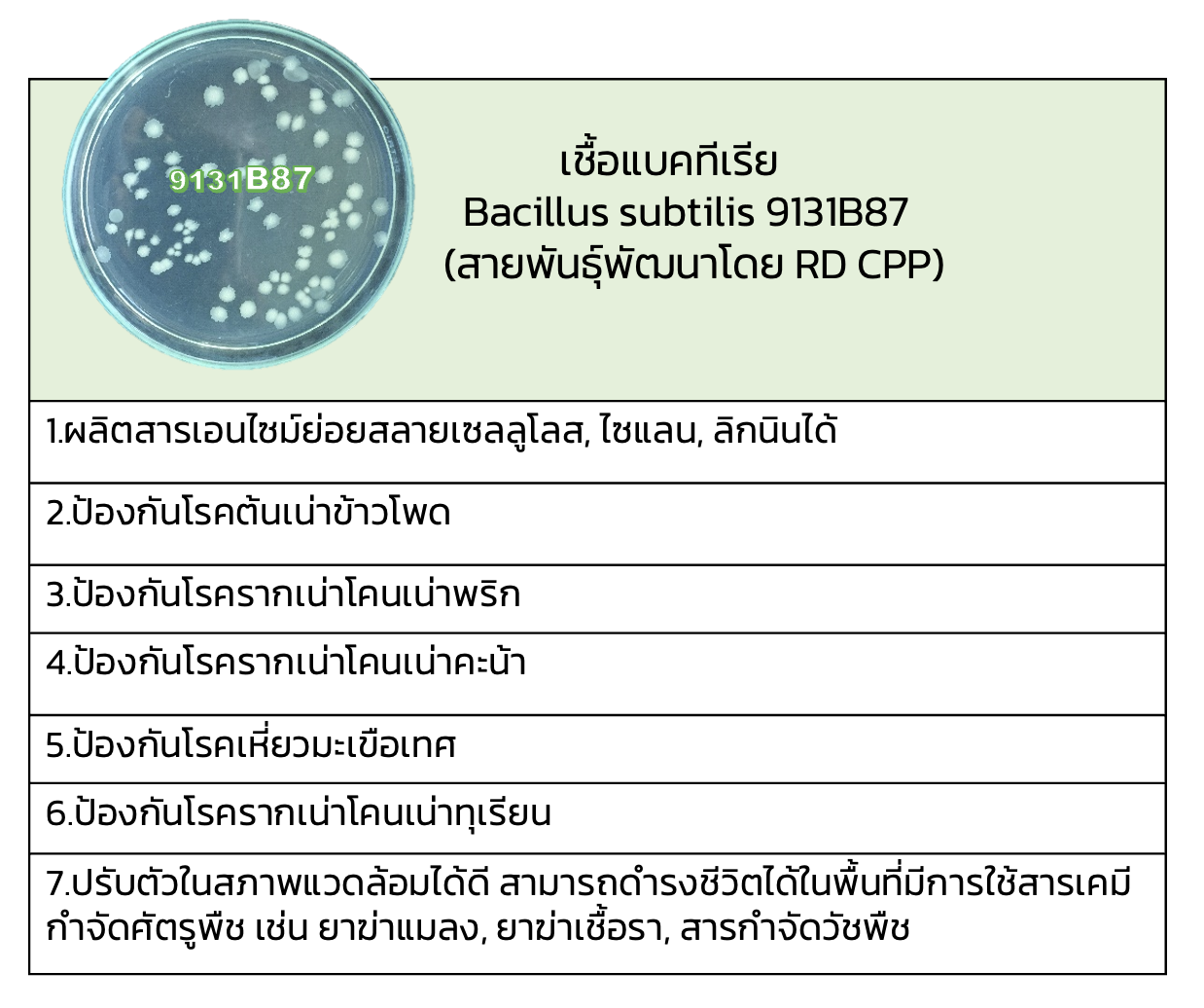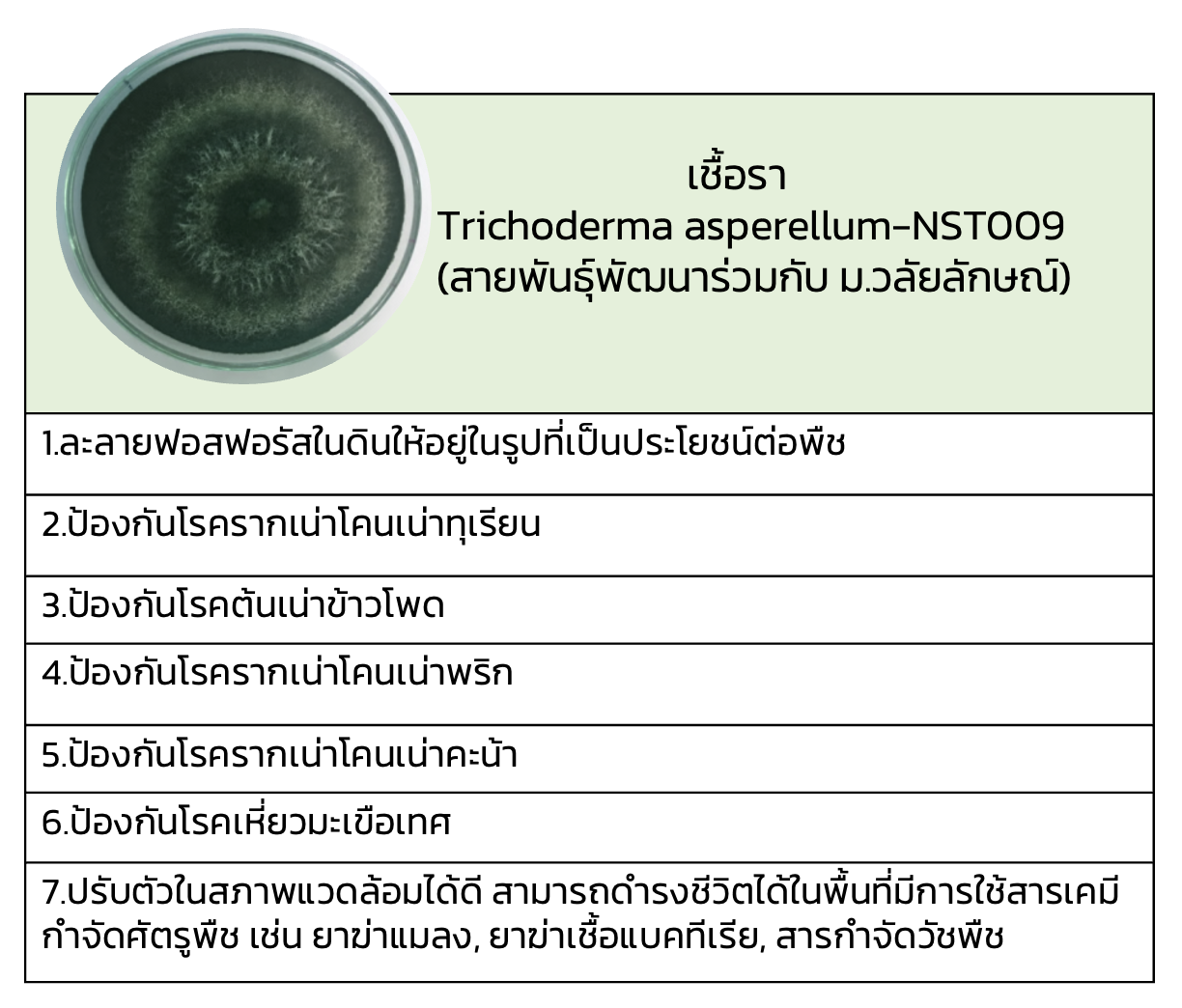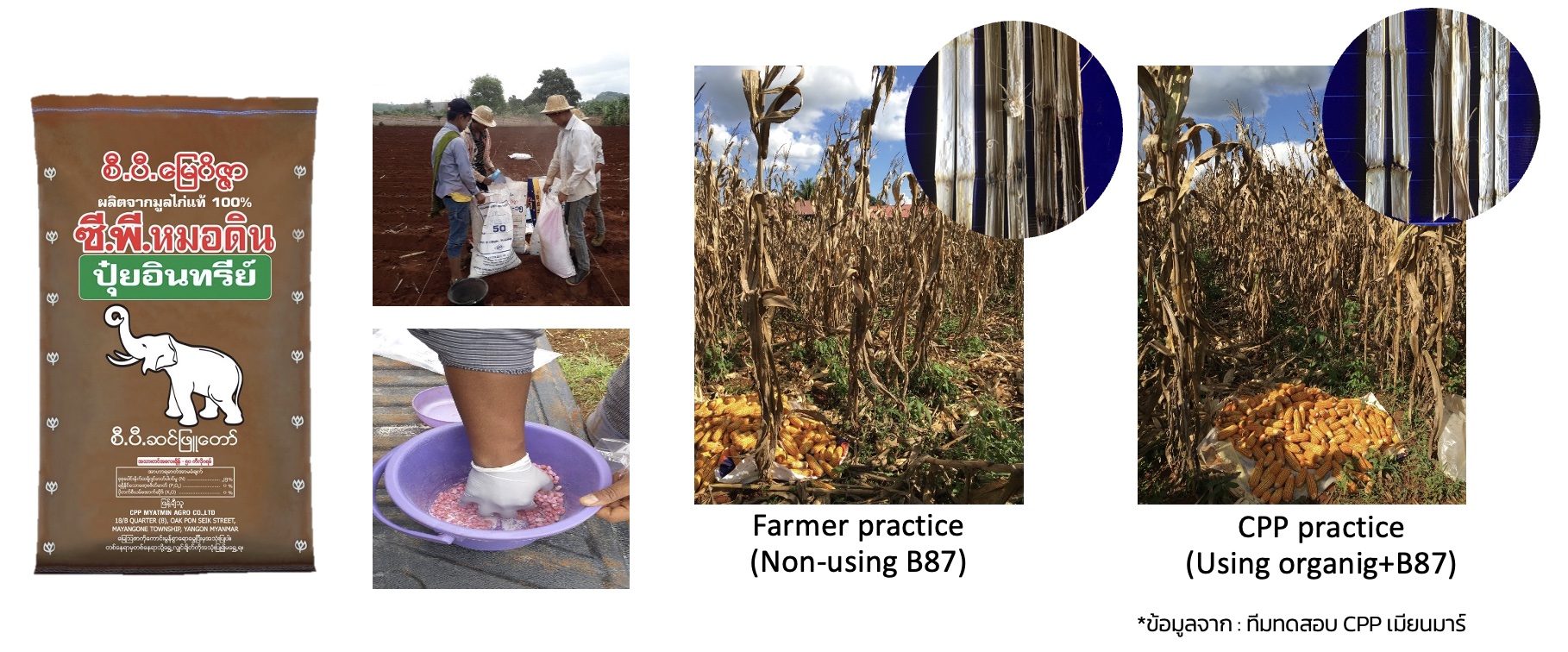Research and development of Microbiology for agriculture
Research and development of Microbiology for agriculture
The Research and development of Microbiology for agriculture unit is affiliated with the Research Center for Soil and Fertilizer Quality Assurance of CHAROEN POKPHAND PRODUCE CO., LTD. The research focuses on developing microbes in various areas, such as enhancing the efficiency of organic fertilizer fermentation, microbes for ammonia removal during the fertilizer fermentation process, microbes promoting growth and increasing crop yields. These microbes help release nutrients trapped in the soil for plant utilization and reduce the excessive use of fertilizers. Additionally, they include microbes for preventing and controlling plant diseases and reducing the reliance on chemical agents for disease control in plants to ensure safety for humans, animals, and the environment.

Research and development of beneficial Microbiology for agriculture

Bacteria
(Developed by RD CPP)
- Produces enzymes capable of breaking down cellulose, solan, and lignin
- Preventing maize stalk rot disease
- Protecting against root rot disease in chili
- Preventing root rot disease in Chinese kale
- Preventing wilting disease in tomatoes
- Preventing root rot disease in Durian
- Adapts well to environmental conditions, can thrive in areas with the use of chemical pesticides such as insecticides, bactericides, and herbicides.

Fungus
(Co-developed with Walailak University)
- dissolved phosphorus in the soil to make it beneficial for plants
- Preventing root rot disease in Durian
- Preventing maize stalk rot disease
- Protecting against root rot disease in chili
- Preventing root rot disease in Chinese kale
- Preventing wilting disease in tomatoes
- Adapts well to environmental conditions, can thrive in areas with the use of chemical pesticides such as insecticides, bactericides, and herbicides.
Research and development of Microbiology for agriculture focuses on 3 main areas:
- Enhancing Fertilizer Fermentation Efficiency
- Developing Microorganisms for Plant Disease Prevention and Control
- Promoting Growth and Increasing Crop Yield with Microorganisms
1. Enhancing Fertilizer Fermentation Efficiency
The organic fertilizer fermentation process requires utilization of microorganisms to decompose organic matter. This necessitates the reliance on specific strains of microorganisms for the decomposition control of materials in an environmentally suitable condition. The objective is to transform the raw compost material into high-quality, plant-friendly organic fertilizer. The research focuses on selecting microorganisms from bacterial, fungal, and actinomycete groups derived from compost piles. The efficiency of these microorganisms in producing enzymes capable of decomposing lignocellulosic materials (cellulose, hemicellulose, and lignin) essential components in plant structures is tested. The aim is to identify five proficient strains for industrial-scale production, which can subsequently employed in large-scale composting operations.
The Bacillus subtilis strain 9131B87 distinctive properties in producing cellulase enzymes to break down cellulose in co-fermentation materials has filed a patent with the Department of Intellectual Property. These align with the corporate policy in the “Organic Fertilizer from Animal Manure” and the process of fermenting organic fertilizer from animal manure utilizing agricultural materials with Bacillus subtilis 9131B87 bacteria as a catalyst.

2. Developing Microorganisms for Plant Disease Prevention and Control
Currently, consumers tend to lean towards agricultural products that are increasingly deemed safe. However, it observed that farmers often use excessive chemical substances to control plant diseases and impact of health in both farmers and consumers. Biological control particularly uses antagonistic microorganisms that recognized as an effective method to reduce the reliance on hazardous chemicals for plant disease control. A research team has isolated the Trichoderma fungus from soil samples around plant roots and further developed the Bacillus subtilis 9131B87 known for its ability to produce cellulase enzymes. These tested for their efficacy in inhibiting and controlling plant pathogens those causing economically significant diseases such as corn root rot, root rot in durian, and root rot in chili. The study found that Trichoderma asperellum TCP2 strain and Bacillus subtilis B87 strain effective in inhibit more than 60% of the pathogens causing root rot and crown rot diseases. These findings suggest that probiotic organic fertilizer, or concentrated microbial inoculants can be successfully applied to enhance plant disease resistance while minimizing the need for harmful chemical interventions.

The application of the Bacillus subtilis strain 9131B87 to mitigate the severity of corn root rot in livestock feed cultivation has shown promising results.
The plots using the Bacillus subtilis 9131B87 strain, in conjunction with organic fertilizer, demonstrated the best disease reduction when applied as a basal dressing before planting and as a second application when the maize was 30 days old. This approach resulted in the most significant reduction in the incidence of root rot decreased 37.34% compared to plots without the use of antagonistic microorganisms where the disease incidence remained at 46.00%. These findings were presented at the Thailand Research Expo & Symposium 2022, organized by the National Research Council of Thailand (NRCT).

The use of organic fertilizer with Bacillus B87 to prevent and control corn root rot in agricultural plots in Shan State, Myanmar has been implemented by CPP Myanmar team. The research focused on developing Bacillus subtilis B87 that antagonistic properties against fungal diseases affecting corn roots and kernels. This microbial strain was incorporated into organic fertilizer and applied as a basal dressing before planting in maize fields belonging to farmers in Shan, Myanmar. The results demonstrated that the plots treated with organic fertilizer containing the B87 exhibited a remarkable reduction in disease incidence reaching 49.18%. The occurrence of root and kernel rot was only 3.0% in contrast to plots where B87 was not applied which experienced a disease incidence of 6.1%. These findings highlight the effectiveness of using Bacillus subtilis B87 in organic fertilizer to control corn root rot in agricultural practices in Shan, Myanmar.

3. Promoting Growth and Increasing Crop Yield with Microorganisms
Promoting plant growth through bio-based methods using strains of bacteria with Plant Growth Promoting (PGP) properties has proven to be effective in enhancing crop quantity and quality. These bacteria transform organic compounds such as insoluble phosphates in the soil. Even when there is a significant amount of phosphate present in the soil then plants may still face a shortage because a large portion of it is in a form that is not easy to soluble in water. Therefore, these bacteria contribute significantly to the solubilization of difficult-to-dissolve phosphate compound make them more accessible and beneficial for plant utilization. Furthermore, these bacteria are involved in the production of substances similar to plant hormones such as auxin which stimulates root development and accelerates the overall growth of above-ground and below-ground plant parts. The use of bacteria presents an intriguing avenue for promoting the growth of economically important crops such as durian, maize, and rice. Their role in enhancing economic productivity lies in their ability to boost crop growth and improve overall yield and quality.

Research and Development of Organic Fertilizer C.P. Mordin N.T. 009
The microbiology research team has conducted a study about Trichoderma asperellum strain NST009 in collaboration with Walailak University. The study focuses on the fermentation of the microorganism in organic fertilizer, aiming to promote growth and enhance resistance against root and stem diseases in durian, an economical plant. The study covers both pre and post harvest periods. Based on tests conducted in durian orchards in the southern region, when we use Trichoderma for fermenting organic fertilizer, it results in 16.97% increase in the height of young durians. In comparison, durian in orchards without use of microorganisms only showed 9.46% increase. Additionally, the study revealed that durian orchards using Trichoderma effect a significant increase (18.56x) in beneficial phosphorus levels. Moreover, the quantity of root-rot-causing fungi in durian decreased contributing to reduction of damage to the trees. Importantly, these microorganisms are considered safe for users and provide a sustainable approach to crop business.

Organic Fertilizer C.P. Mordin N.T. 009
- Processed through complete decomposition and fermentation with beneficial microbial strains, Trichoderma asperellum NST009 and Bacillus subtilis B87.
- Contains essential nutrients 1N-3P-3K, secondary nutrients Mg, Ca 0.5-1%, organic matter >20%.
- Enhances plant resistance to diseases related to root and stem systems reducing issues like root rot and crown rot accumulated in the soil.
- Stimulates root development and overall plant growth.
- Aids in the release of phosphorus trapped in the soil making it available for plant uptake.
- Improves soil structure, nutrient retention, and water absorption, allowing plants to efficiently utilize nutrients.
- Facilitates the decomposition of crop residues in the soil after harvesting.
- Contains a minimum of 100,000 beneficial microorganisms per gram of fertilizer.

